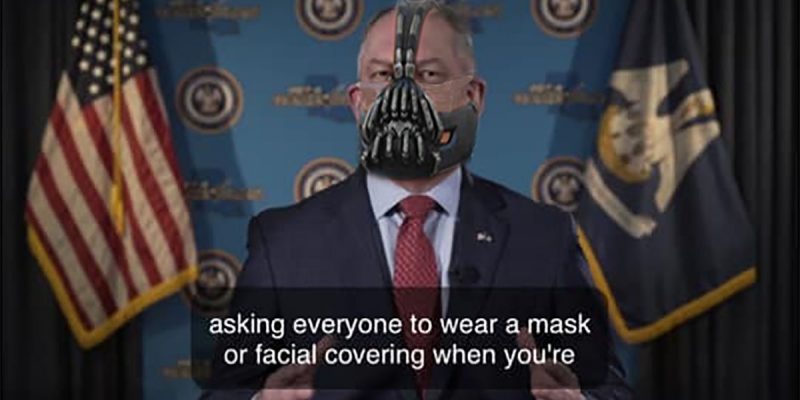Democrat Gov. John Bel Edwards finally edged closer to following the science, almost a year late, and loosened the leash on the people by lifting a mask mandate – but not nearly enough.
Today, by proclamation Edwards finally junked much of a set of largely ineffective restrictions on people’s behavior and on commerce, as a response to the Wuhan coronavirus pandemic. This follows similar actions made in neighboring states as long as nearly two months ago – while some states never imposed these at all.
Except for public transportation, schools, health facilities, and the state agencies under control of his office, out goes the face covering mandate (and some narrow exceptions exist to the locations still included). Perhaps to justify these continued shackles, at his announcement of that Edwards lied to the public in saying “the evidence is clear …the science is well-established” that masks “work.” He surely cannot have missed the latest commentary on the matter, which illuminates the shortcomings of research that makes such a claim and reviews the extant literature, that shows masking as publicly practiced has no significant impact on case counts.
That doesn’t mean that a mask, of proper construction worn correctly, won’t convey some advantage to preventing infection from getting in or out. The problem is – and this has proven the great failing of the Edwards Administration in its confusing of the concepts of nonpharmaceutical interventions in isolation and holistic public policy based upon human behavior – that mandates don’t effectively ensure that everybody covers their faces in social situations (and only necessarily indoors), or, if they do, they don’t use effective material or place it in an effective manner.
On a daily basis, I encounter multiple medical personnel. Some don’t wear a mask at all. Some do, but don’t wear it correctly. Some do, but don’t wear one constructed in an effective way. Almost none don’t do all of the above.
More anecdotal evidence: in public, over the past month I estimate at the grocery store I frequent about a third of shoppers didn’t wear a mask at all (despite the premises claiming such wearing was required). At a car dealership I visited last week, I counted about two dozen people inside. Myself, one other customer, and one employee only had on masks. Of course, in both settings people can avoid extended close contact with others. This is common sense trumping ill-considered, one-size-fits-all public policy more concerned with image and ideology than with producing beneficial policy outcomes.
As an instrument of public policy, a universal masking requirement, as the above research has demonstrated, works very poorly to stem infections. The correct policy all along was to require it only in sensitive areas such as health care settings and exceptionally crowded indoor areas of limited mobility. Otherwise, it’s best left up to the individual (and to the merchant’s discretion, although look for few places to retain that for long now as Louisianans will shun most places that would require covering and where freed the market will force holdout establishments to relent).
Thus, Edwards revised order still goes too far, keeping too many restrictions. Worse, it allows local governments the option to maintain whatever of these they want, which undoubtedly will allow some to keep people in bondage.
Advertisement
At least he chose better on another set of nonpharmaceutical interventions. The proclamation also eliminates most commercial restrictions – just in time to acknowledge the latest research that distancing has little impact on virus transmission. Rather, it depends upon the concentration of the bug, and at least the few restrictions remaining seem to pertain at least somewhat to this reality: 75 percent indoor capacity (except worship services, which have no restriction) unless people are masked, which may then be at full capacity, and a bit of physical distancing at places like bars and restaurants.
Finally, keep in mind any restrictions imposed concern a virus which in the aggregate is hardly more deadly that the seasonal flu that kills almost nobody younger than 65 who doesn’t have any of a range of existing medical conditions. Flu policy has had made correct balancing decisions in its implementation, as opposed to Edwards’ coronavirus policy that way disproportionately attenuated individual liberty for no good scientific reason.
Unfortunately, besides the needless affront to human dignity, this blundering has cost the state, and cost dearly. Driven by substance abuse and suicidal ideation, excess deaths (the number above the moving average of the past few years) beyond those caused by the virus rose significantly in the first few months of the pandemic. The main trigger for these appears to be ignoring health concerns and despair inculcated by restricting personal liberty. Generally speaking, on balance social science research indicates the restrictiveness of an economic lockdown had no relationship to total excess deaths, including those from the virus.
Nationally, 28 percent of excess deaths in 2020 appeared to come from non-virus reasons. In Louisiana, that would appear to be closer to 30 percent. And these kinds of increases seem to track closely the presence of limits placed on liberty, according to North Carolina data.
While an improvement over his previous orders, Edwards still lags in wisdom exhibited by all of his state’s nearby neighbors who over the past two months have lifted nearly every restriction. Data clearly show these kinds of restrictions are associated with little impact on infections but some negative impact on excess deaths. Hopefully, his mistake won’t encourage the loss of any more additional lives.
Advertisement
Advertisement

